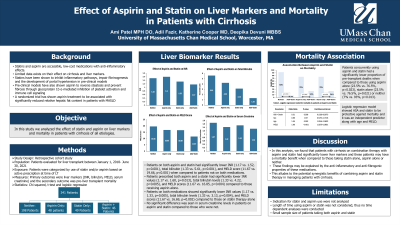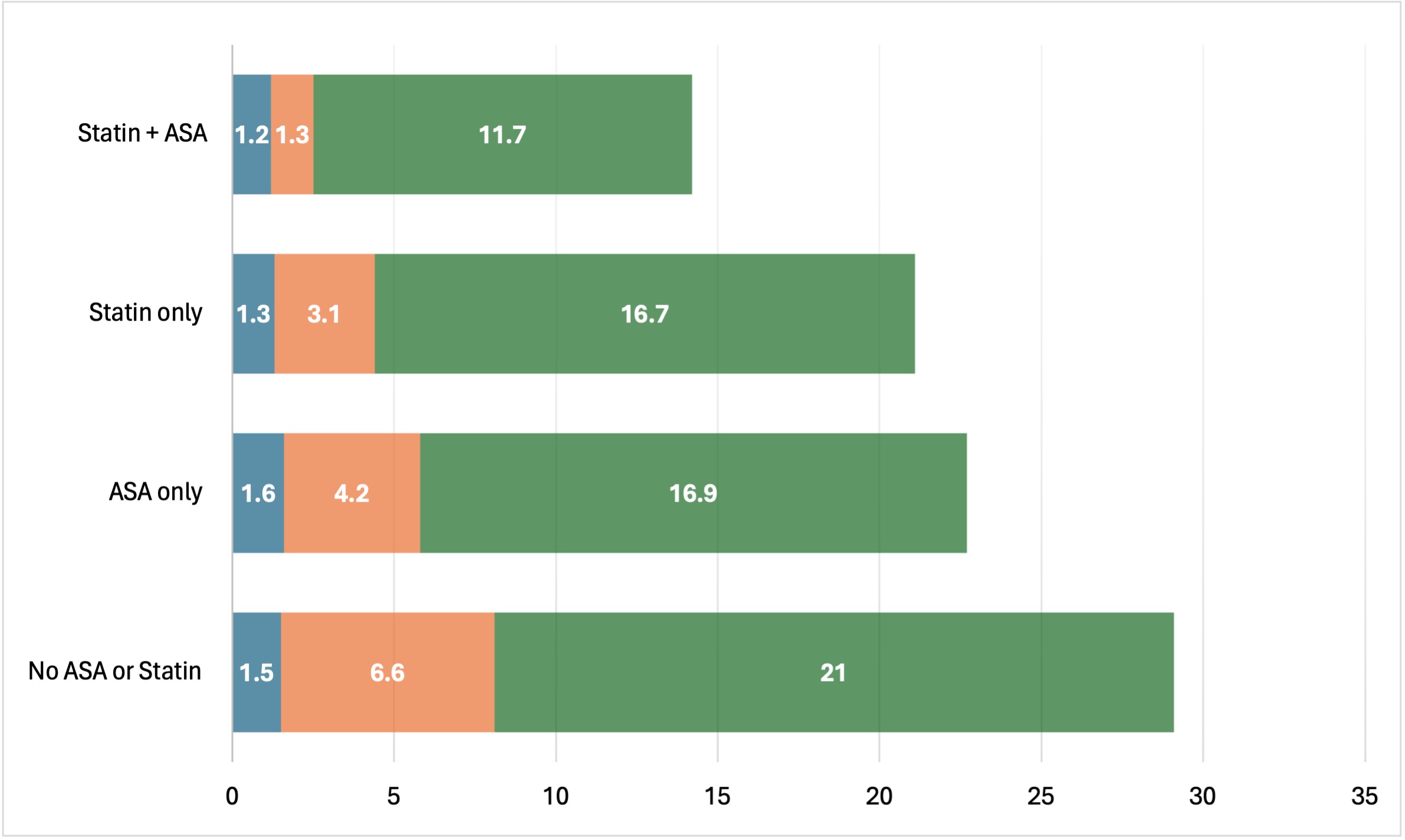Tuesday Poster Session
Category: Liver
P4635 - Effect of Aspirin and Statin on Liver Markers and Mortality in Patients With Cirrhosis
Tuesday, October 29, 2024
10:30 AM - 4:00 PM ET
Location: Exhibit Hall E

Has Audio

Ami K. Patel, MPH, DO
University of Massachusetts Chan Medical School
Worchester, MA
Presenting Author(s)
Ami K. Patel, MPH, DO1, Adil Fazir, 1, Katherine Cooper, MD2, Deepika Devuni, MD3
1University of Massachusetts Chan Medical School, Worchester, MA; 2University of Massachusetts Chan Medical School, Worcester, MA; 3University of Massachusetts Memorial Medical Center, Worcester, MA
Introduction: Statins and aspirin are accessible, low-cost medications with anti-inflammatory effects. Limited data exists on their effect on cirrhosis and liver markers. In this study we analyzed the effect of statin and aspirin on liver markers and mortality in patients with cirrhosis of all etiologies.
Methods: We performed a single-center retrospective review of patients evaluated for liver transplant between January 1, 2018- June 30, 2021. Patients were categorized by statin use, aspirin use and cirrhosis etiology. Primary outcomes were liver markers (INR, bilirubin, MELD, serum creatinine) and secondary outcome was pre-liver transplant mortality. Outcomes were compared between 1) both medications vs. all other 2) both medications vs aspirin alone and 3) both medications vs. statin alone.
Results: A total of 341 patients were analyzed, of which 94 were on aspirin, 95 were on a statin and 46 were taking both, aspirin and statin. Patients on both aspirin and statin had significantly lower INR (1.17 vs. 1.52, p< 0.001), total bilirubin (1.33 vs. 5.61, p< 0.001), and MELD score (11.67 vs. 19.66, p< 0.001) when compared to patients not on both medications. Likewise, patients prescribed both aspirin and a statin had significantly lower INR values (1.17 vs. 1.60, p=0.013), total bilirubin levels (1.33 vs. 4.22, p=0.005), and MELD scores (11.67 vs. 16.85, p=0.004) compared to those receiving aspirin alone. Similarly, patients on both medications showed significantly lower INR values (1.17 vs. 1.33, p=0.005), total bilirubin levels (1.33 vs. 3.13, p=0.004), and MELD scores (11.67 vs. 16.69, p=0.002) compared to those on statin therapy alone. Furthermore, patients concurrently using aspirin and a statin had significantly lower mortality rates compared to those using aspirin alone (23.5% vs. 76.5%, p=0.023) or statin alone (23.5% vs. 76.5%, p=0.021). No significant difference was seen in serum creatinine levels in patients on aspirin and statin compared to those who were not.
Discussion: In this analysis, we found that patients with cirrhosis on combination therapy with aspirin and statin had significantly better liver markers and had a mortality benefit. These findings may be explained by the anti-inflammatory properties of these medications. This alludes to the potential synergistic benefits of combining aspirin and statin therapy in managing patients with cirrhosis of all etiologies. These findings should inform future studies to optimize patients pending liver transplantation.

Disclosures:
Ami K. Patel, MPH, DO1, Adil Fazir, 1, Katherine Cooper, MD2, Deepika Devuni, MD3. P4635 - Effect of Aspirin and Statin on Liver Markers and Mortality in Patients With Cirrhosis, ACG 2024 Annual Scientific Meeting Abstracts. Philadelphia, PA: American College of Gastroenterology.
1University of Massachusetts Chan Medical School, Worchester, MA; 2University of Massachusetts Chan Medical School, Worcester, MA; 3University of Massachusetts Memorial Medical Center, Worcester, MA
Introduction: Statins and aspirin are accessible, low-cost medications with anti-inflammatory effects. Limited data exists on their effect on cirrhosis and liver markers. In this study we analyzed the effect of statin and aspirin on liver markers and mortality in patients with cirrhosis of all etiologies.
Methods: We performed a single-center retrospective review of patients evaluated for liver transplant between January 1, 2018- June 30, 2021. Patients were categorized by statin use, aspirin use and cirrhosis etiology. Primary outcomes were liver markers (INR, bilirubin, MELD, serum creatinine) and secondary outcome was pre-liver transplant mortality. Outcomes were compared between 1) both medications vs. all other 2) both medications vs aspirin alone and 3) both medications vs. statin alone.
Results: A total of 341 patients were analyzed, of which 94 were on aspirin, 95 were on a statin and 46 were taking both, aspirin and statin. Patients on both aspirin and statin had significantly lower INR (1.17 vs. 1.52, p< 0.001), total bilirubin (1.33 vs. 5.61, p< 0.001), and MELD score (11.67 vs. 19.66, p< 0.001) when compared to patients not on both medications. Likewise, patients prescribed both aspirin and a statin had significantly lower INR values (1.17 vs. 1.60, p=0.013), total bilirubin levels (1.33 vs. 4.22, p=0.005), and MELD scores (11.67 vs. 16.85, p=0.004) compared to those receiving aspirin alone. Similarly, patients on both medications showed significantly lower INR values (1.17 vs. 1.33, p=0.005), total bilirubin levels (1.33 vs. 3.13, p=0.004), and MELD scores (11.67 vs. 16.69, p=0.002) compared to those on statin therapy alone. Furthermore, patients concurrently using aspirin and a statin had significantly lower mortality rates compared to those using aspirin alone (23.5% vs. 76.5%, p=0.023) or statin alone (23.5% vs. 76.5%, p=0.021). No significant difference was seen in serum creatinine levels in patients on aspirin and statin compared to those who were not.
Discussion: In this analysis, we found that patients with cirrhosis on combination therapy with aspirin and statin had significantly better liver markers and had a mortality benefit. These findings may be explained by the anti-inflammatory properties of these medications. This alludes to the potential synergistic benefits of combining aspirin and statin therapy in managing patients with cirrhosis of all etiologies. These findings should inform future studies to optimize patients pending liver transplantation.

Figure: Title: Liver Markers in Patient Groups, Stratified by Aspirin and Statin Use
Legend: Blue-INR, Orange- Total Bilirubin and Green-MELD
Legend: Blue-INR, Orange- Total Bilirubin and Green-MELD
Disclosures:
Ami Patel indicated no relevant financial relationships.
Adil Fazir indicated no relevant financial relationships.
Katherine Cooper indicated no relevant financial relationships.
Deepika Devuni: Massachusetts Department of Public Health – Grant/Research Support. National Institute on Alcohol Abuse and Alcoholism – Grant/Research Support. Sequana Medical – Grant/Research Support.
Ami K. Patel, MPH, DO1, Adil Fazir, 1, Katherine Cooper, MD2, Deepika Devuni, MD3. P4635 - Effect of Aspirin and Statin on Liver Markers and Mortality in Patients With Cirrhosis, ACG 2024 Annual Scientific Meeting Abstracts. Philadelphia, PA: American College of Gastroenterology.

